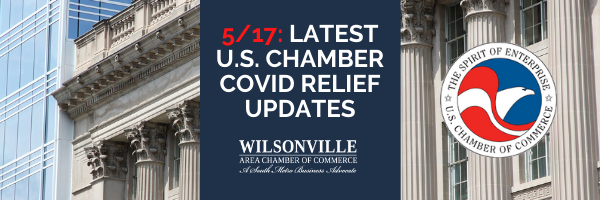The latest news from U.S. Chamber of Commerce…
What’s Happening (OSCC Political Observations)
It’s crunch time in the Legislature as we move into the final six weeks of the 2021 session.
We keep thinking the pace will pick up anytime now. There is some evidence this is starting to happen. Last Friday was the ‘posting deadline’ for the second chamber. Bills had to be posted for a work session on Friday, May 14
th in order to advance out of the second chamber committees. Any bill not posted is considered dead.
Those bills that were posted must be officially voted out of committee by Friday, May 28
th, otherwise they too will die.
Policy committees will shut down on May 28
th – leaving only Rules, Revenue and the Joint Ways and Means Committees open for business.
As is the case every session, there are rumors of an early adjournment (potentially as soon as June 18
th) or a split adjournment (Senate adjourns before the House), though at this point the most likely timeline for the conclusion of this year’s session remains the constitutionally required adjournment date – June 27
th.
This week, we will receive the May Revenue Forecast, which will be the guiding forecast for finalizing the 2021-23 budget. We will begin to see budget bills pass over the next couple of weeks. Last week, that movement already started with the passage of the $9.3 billion K-12 education budget.
We are hearing that budget bills should move first and that policy bills in the Joint Ways and Means Committee will move after the budget bills have cleared.
Already, with the budget bills, we have interesting political dynamics starting to play out. The Governor initially threatened to veto the $9.3 billion K-12 budget put forward by the legislature, even though it is the largest education budget in our history. The Governor initially raised concerns that not enough had been done to help impacted communities of color, but appears now to have reached accord with lawmakers and backed down from her veto threat. This just highlights that we still have a long way to go on a number of key issues, and legislators have less than six weeks to figure it all out.
Updated COVID Guidance
Following the CDC’s announcement on Thursday that vaccinated individuals no longer need to wear masks but for certain situations, Governor Kate Brown announced Oregon would also adopt the same recommendation. Governor Brown’s office did not release any guidance to businesses at the time of the announcement on how the change may impact the workplace rules and restrictions adopted by the Oregon Health Authority and OR-OSHA.
Instead, Governor Brown’s office said they would release additional guidance for employers “in the coming days.” OSCC and others are seeking clarity from Governor Brown’s administration on this issue and will share any updated information as it becomes available. We expect updated guidance to be released as soon as today.
100% Clean Electricity Mandate (HB 2021)
The bill establishing a 100% clean electricity mandate in Oregon received its first hearing in over a month on Thursday. The bill re-emerged with a -46 amendment which, like prior versions, was negotiated behind closed doors between environmental groups, investor-owned electric utilities and a small group of Democrat lawmakers.
HB 2021 is all about eliminating natural gas as an electricity-generating resource.
The summary of the new version of HB 2021 can be found here.
OSCC remains skeptical of HB 2021 due to our belief that its adoption would lead to an increase in the cost of electricity for commercial and industrial users – but more importantly – a decrease in the reliability of Oregon’s power supply as natural gas is phased out as a baseload generating resource for Oregon customers. We are deeply skeptical of a regime that would put Oregon on par with California and its rolling blackouts and brownouts due to lack of available “renewable” resources, particularly during peak usage times.
The outlook for HB 2021 remains uncertain. The bill spends tens of millions of dollars in new projects, so it would likely need to be reviewed by the Joint Committee on Ways and Means where it would face a more skeptical group of lawmakers.
Unemployment Insurance Tax Fix (HB 3389)
The Senate Labor and Business Committee held a public hearing last week on legislation to provide relief to employers from large increases in unemployment insurance tax rates.
OSCC testified in favor of this important bill and urged lawmakers to pass it as soon as possible. The bill has been scheduled for a committee vote on Tuesday.
HB 3389 allows employers to defer payment (without penalties or interest) until June 30, 2022, of up to one-third of tax owed in 2021 if their tax rate increased by at least 0.5 percentage points between 2020 and 2021. The bill also provides a formula for employers to have a percentage of their tax bill forgiven depending on the rate of increase they experienced (see below).
But perhaps most importantly, the bill attempts to hold employers most impacted by the pandemic harmless from future increases by excluding layoffs that took place during the pandemic when calculating an employer’s experience rating.
OSCC is expecting this bill to pass soon.

